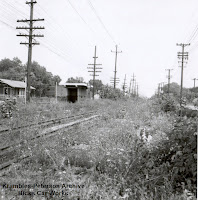Thanks to a fascinating collection of photographs from Art Peterson, we can take a tour of the CA&E. The catch? The photos were all taken several years after the end of service, likely in 1962 though possibly in 1961. Still, they make for an arresting snapshot of the railroad in its last days before removal.
No reproduction without permission.
Main Line - Forest Park to Wheaton
28th Avenue, Maywood, looking east from the IHB bridge
Garden Home (51st Avenue), Bellwood, looking east
Taft Avenue, Berkeley, looking east
Poplar Avenue, Elmhurst, looking east
York Street, Elmhurst, looking west
Illinois Central crossing, Elmhurst, looking west
Spring Road, Elmhurst, looking east
Spring Road, Elmhurst, looking west
Villa Avenue, Villa Park, looking east
Ardmore Avenue, Villa Park, looking east
Ardmore Avenue, Villa Park, looking west
Aurora Branch
Warrenville, looking west
Batavia Junction, Naperville, looking west
Aurora Avenue, Aurora, looking northeast
Aurora Avenue, Aurora, looking southwest
Batavia Branch
Batavia terminal, looking north
Elgin Branch
Prince Crossing (Ingalton Road), looking northwest
Prince Crossing, looking northwest
Elgin, looking north
Museum Trains at Wheaton, Spring 1962
Cars 36 and 319 spotted just west of Wheaton Avenue in Wheaton
Cars 36 and 319 spotted west of Wheaton Avenue in Wheaton as EJ&E 212 approaches
The "east hospital train" makes its last stop at the Wheaton station: cars 36, 319, 409, 303, 318, 308, and 315.
EJ&E 212 switching the four cars going to Trolleyville: 303, 409, 319, and 36.
EJ&E with the four Trolleyville cars.
EJ&E 212 shoving the four Trolleyville cars over West Street in Wheaton.
EJ&E 212 pulling what appears to be cars 315, 308, and 318.
EJ&E 212 with cars 315 and 308 behind it.
The rearranged "east hospital train" gets picked up by a C&NW SD9: cars 318, 308, 315, 36, 319, 409, and 303.
Unidentified Photos
Photo #21
Photo #33





















































6 comments:
Love these! I think mystery photo 34 might be looking north east in Warrenville just after Batavia RD, The station would be behind the photographer. that might the bridge over the dupage river and way off in the distance there is Butterfield RD. Photo 28 could also be St Charles Rd looking toward Wayne.
Those are both excellent suggestions. 34 in particular is genius. You can see just a sliver of Butterfield on the left, and the bridge in the distance. Warrenville doesn't look anything like that today!
# 35 is very likely Maywood. In the distance is a tower which is identical to the Ninth Avenue tower controlling the crossing at Ninth Avenue. — Jim Dyer
Photo 14 and Photo 21 are the same location, and I am pretty certain this is Taylor Avenue Glen Ellyn, with the start of metal power poles like those seen at Glen Oak cut.
O. Anderson
Guessing by angle of intersection, my recollection of the grades, and direction of shadows, I think #26 may be at Dunham Rd looking NW on the Elgin Branch.
O. Anderson
That's certainly possible. Some of these have very little to go on -- just weed-grown tracks and lots of trees. Even on a fairly short railroad, that doesn't always narrow it down. It's not like we're trying to identify a grade crossing somewhere on the New York Central.
Post a Comment